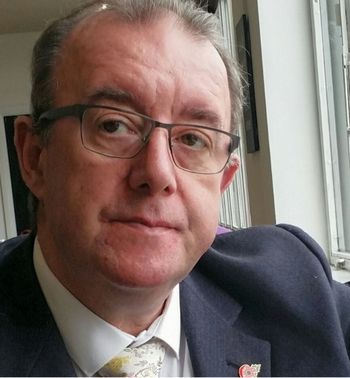17 April 2025
What is your role?
I am a Senior Lecturer in the Centre for Pharmaceutical Medicines Research at King’s College London. I teach a variety of courses including clinical trial ethics, clinical trial designs and research methods to Masters students. I also co-supervise two PhD students - one on regulatory processes and the other in wound healing.
As an advocate for patients with rare diseases I co-Chair the Blue Research Ethics Committee at King’s College London, and I am on the KHP Rare Disease Network steering committee. I also act as one of the research integrity champions within King’s College London. Outside of the university, I am a part of the NHS Rare Diseases Forum — where we are looking to establish common and accepted standards of clinical care for all rare diseases.
I am vice chair of the York Research Ethics Committee under the Health Research Authority, a committee with special interest in genetic medicines.
Currently I am involved in retinoid research and assisting in the commercialisation of a new family of synthetic retinoids with Durham University.
What do you enjoy most about your role?
I have done early and late phase medical product development for more than 30 years with contract research organisations, small companies, large companies and governments.
In that time, I have done a few things right, but many things wrong, as in the area I specialise in – neurology development – we are often left feeling our way forward. I like to think that by working with students and colleagues I can pass on the learning from the mistakes I have made, and help students and colleagues to think beyond the textbook.
I am lucky in that I have been able to keep a portfolio of things going, keeping one foot in the commercial world while having an input into policy and development. I also enjoy looking at the cutting-edge technologies – such as Biodigital Convergence – and seeing how these might improve the lives of patients with rare diseases. The opportunity to share these developments with the next generation of researchers is a real honour.
What inspired you to get into this work?
I decided on a career in research during medical school. Bringing wider benefit has always been important to me, and I think the doctor, society relationship is an often-neglected aspect.
During my spells working in Africa with NGOs and charities, I realised the importance of justice in healthcare, and the distribution of resources by need – a theme of my PhD from St Andrews. This passion for resource allocation by need drew me into rare diseases research.
Rare diseases are collectively a large area of unmet need, and there are commonalities of the diagnostic Odessey and access to care and new medications. I am dedicated to doing medical product development in a fair and equitable way. This passion leads me to support open research and education. My involvement in medical ethics is a natural consequence of my passion for justice.
What are the benefits of working in partnership?
Partnership brings so many benefits - benefits in terms of broadening my understanding of new technologies and how they may help patients to have fulfilled lives, benefits in terms of having new perspectives on the value and meaning of the research I am involved in, and an understanding on how to look at justice from different angles
Partnership means my work is not within an ivory tower or limited to theoretical constructs, but I can make my work and ideas concrete – such as the project on standards. Here the concept of justice is central but is moulded by patients, clinicians, advocates, and policy makers into something concrete that I hope will improve the lives of rare disease patients.
Partnership is a two-way process. I have learned so much from the organisations and people I have partnered with over the last 30 years. Partnerships have shaped the clinical trial designs I do, and the ethical decision I make.
Partnership is the only way to keep research focused and relevant.
What would be your one career tip?
Take every opportunity to learn. As an officer once said to me no situation is not valuable – even the worst of situations can serve as a horrible example .
Never call yourself an expert — an ex is something that is dead or passed and a spurt is a drip under pressure.





